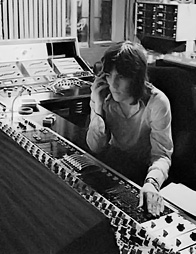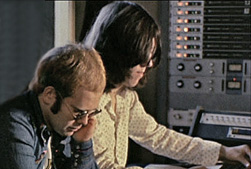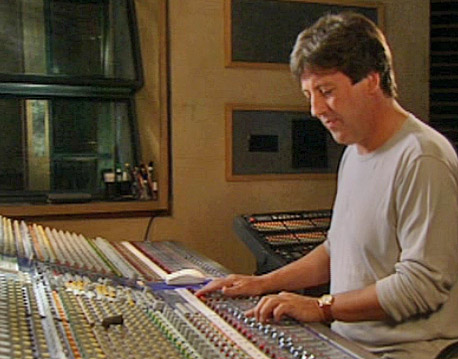
David began his professional career as a recording engineer at the now legendary Trident studios in London. Following a formal musical education and a 'misspent' youth playing keyboards and guitar in school bands, his first day at work was spent making tea for David Bowie's Space Oddity session in July 1969. David soon graduated to the position of assistant engineer, one of his first projects being George Harrison's All Things Must Pass album. These were hectic and heady days at Trident, and David was soon promoted to the post of recording engineer to join a formidable team of in-house engineers which included Roy Thomas Baker, Ken Scott, Robin Cable & Mike Stone. Between them, this team was to shape the sound of contemporary music over the following decades. They also acted as a catalyst for the design of the first Trident mixing console.
Being an in-house engineer meant that any day one could be recording a blues album and the next a medieval chamber orchestra. While many recordings were made to 8 track, some 4 track and even stereo recordings were still being made. Overdubbing was often limited to vocals, the entire backing tracks being cut live. David's first session was one of these; a forty piece orchestra and rhythm section and vocals all. The experience gained by working with such a vastly different cross section of musical styles, often with the top artists and musicians of the day, was invaluable in building a thorough knowledge of recording and production techniques.
David soon found his own niche working with the leading progressive rock bands of the day, and with two producers in particular - John Anthony & Gus Dudgeon.
John Anthony, who at the time was producing many albums for the independent Charisma label, offered David his first opportunity to engineer an entire album from start to finish. This was the Genesis album Nursery Chryme. The Genesis connection would be revisited some years later...

One of David's albums for Gus Dudgeon was the landmark Elton John album Goodbye Yellow Brick Road. This album brought David his first Grammy nomination, for Best Engineered Recording. Around this time, synthesizers were making their first appearance on commercial recordings. As the only musically trained engineer at Trident, David became the country's first in-house programmer and session synthesizer player. The Yellow Brick Road album track Funeral For A Friend gave him the opportunity to make the synthesizer his own.
After five years at Trident, in the summer 1974, David left to begin his career as an independent producer and musician. His first project was his own album for Ringo Starr's new record label - a solo synthesizer album, recorded at Ringo's studio near Ascot, formerly John Lennon's house and pictured on his Imagine album.
Since his early work with Genesis, David had kept in touch with Phil Collins. This friendship led to Phil suggesting David for the joint roles of producer and engineer on the milestone Genesis album Trick Of The Tail in 1976. This became a strong and successful association continuing over five albums, making Genesis a household name and launching Phil Collins as a vocalist.
By now David was beginning to seek out opportunities to develop his compositional talents. Working with Mike Oldfield on his album QE2, he co-composed several of the tracks. Also around this time, he made his first excursion into the world of movie scoring and composing for orchestra, leading to, in 1983, the composition of the score for Educating Rita.

Seeking new challenges, David moved to Los Angeles in 1985. Here he founded one of the first dedicated MIDI studios, working on many television movies and record projects. He further developed his production career by moving into the jazz field and achieving Grammy success with America's leading fusion band The Yellowjackets. A long-lasting partnership also developed with ex-Police guitarist Andy Summers, bringing a further Grammy nomination. A relationship with musical instrument manufacturer Ensoniq was forged, with David consulting on instrument design and creating custom signature sounds for their sample library. David is also a multimedia software consultant.
Now living back in England, David continues to work in all these arenas on both sides of the Atlantic. Recent years have seen David spending more time as an arranger and keyboard player, often working in New York. He has written numerous orchestral and song arrangements for movies and records, at the same time doing extensive programming and performing work. Further experience in other musical genres and markets continues to be explored, notably R&B and hiphop together with more pop work. A larger slice of his time is now devoted to writing and producing his own projects alongside developing young talent.
David has his own studio which he uses for pre-production, recording, mixing and his own composition work.
